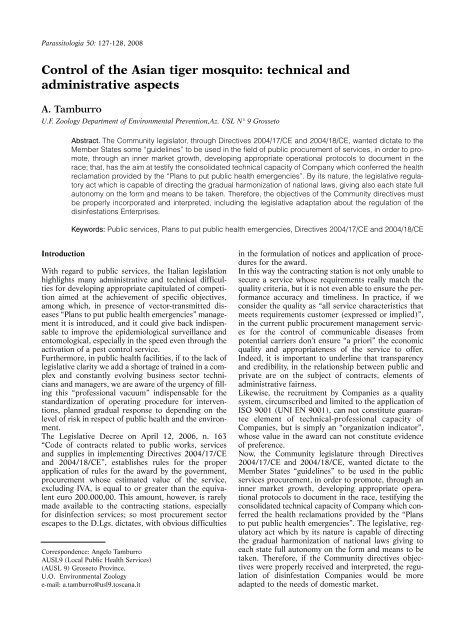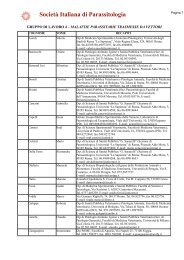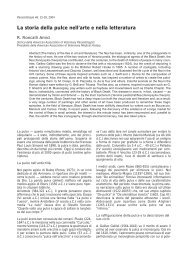impaginato piccolo - Società Italiana di Parassitologia (SoIPa)
impaginato piccolo - Società Italiana di Parassitologia (SoIPa)
impaginato piccolo - Società Italiana di Parassitologia (SoIPa)
Create successful ePaper yourself
Turn your PDF publications into a flip-book with our unique Google optimized e-Paper software.
<strong>Parassitologia</strong> 50: 127-128, 2008<br />
Control of the Asian tiger mosquito: technical and<br />
administrative aspects<br />
A. Tamburro<br />
U.F. Zoology Department of Environmental Prevention,Az. USL N° 9 Grosseto<br />
Introduction<br />
Abstract. The Community legislator, through Directives 2004/17/CE and 2004/18/CE, wanted <strong>di</strong>ctate to the<br />
Member States some “guidelines” to be used in the field of public procurement of services, in order to promote,<br />
through an inner market growth, developing appropriate operational protocols to document in the<br />
race; that, has the aim at testify the consolidated technical capacity of Company which conferred the health<br />
reclamation provided by the “Plans to put public health emergencies”. By its nature, the legislative regulatory<br />
act which is capable of <strong>di</strong>recting the gradual harmonization of national laws, giving also each state full<br />
autonomy on the form and means to be taken. Therefore, the objectives of the Community <strong>di</strong>rectives must<br />
be properly incorporated and interpreted, inclu<strong>di</strong>ng the legislative adaptation about the regulation of the<br />
<strong>di</strong>sinfestations Enterprises.<br />
Keywords: Public services, Plans to put public health emergencies, Directives 2004/17/CE and 2004/18/CE<br />
With regard to public services, the Italian legislation<br />
highlights many administrative and technical <strong>di</strong>fficulties<br />
for developing appropriate capitulated of competition<br />
aimed at the achievement of specific objectives,<br />
among which, in presence of vector-transmitted <strong>di</strong>seases<br />
“Plans to put public health emergencies” management<br />
it is introduced, and it could give back in<strong>di</strong>spensable<br />
to improve the epidemiological surveillance and<br />
entomological, especially in the speed even through the<br />
activation of a pest control service.<br />
Furthermore, in public health facilities, if to the lack of<br />
legislative clarity we add a shortage of trained in a complex<br />
and constantly evolving business sector technicians<br />
and managers, we are aware of the urgency of filling<br />
this “professional vacuum” in<strong>di</strong>spensable for the<br />
standar<strong>di</strong>zation of operating procedure for interventions,<br />
planned gradual response to depen<strong>di</strong>ng on the<br />
level of risk in respect of public health and the environment.<br />
The Legislative Decree on April 12, 2006, n. 163<br />
“Code of contracts related to public works, services<br />
and supplies in implementing Directives 2004/17/CE<br />
and 2004/18/CE”, establishes rules for the proper<br />
application of rules for the award by the government,<br />
procurement whose estimated value of the service,<br />
exclu<strong>di</strong>ng IVA, is equal to or greater than the equivalent<br />
euro 200.000,00. This amount, however, is rarely<br />
made available to the contracting stations, especially<br />
for <strong>di</strong>sinfection services; so most procurement sector<br />
escapes to the D.Lgs. <strong>di</strong>ctates, with obvious <strong>di</strong>fficulties<br />
Correspondence: Angelo Tamburro<br />
AUSL9 (Local Public Health Services)<br />
(AUSL 9) Grosseto Province,<br />
U.O. Environmental Zoology<br />
e-mail: a.tamburro@usl9.toscana.it<br />
in the formulation of notices and application of procedures<br />
for the award.<br />
In this way the contracting station is not only unable to<br />
secure a service whose requirements really match the<br />
quality criteria, but it is not even able to ensure the performance<br />
accuracy and timeliness. In practice, if we<br />
consider the quality as “all service characteristics that<br />
meets requirements customer (expressed or implied)”,<br />
in the current public procurement management services<br />
for the control of communicable <strong>di</strong>seases from<br />
potential carriers don’t ensure “a priori” the economic<br />
quality and appropriateness of the service to offer.<br />
Indeed, it is important to underline that transparency<br />
and cre<strong>di</strong>bility, in the relationship between public and<br />
private are on the subject of contracts, elements of<br />
administrative fairness.<br />
Likewise, the recruitment by Companies as a quality<br />
system, circumscribed and limited to the application of<br />
ISO 9001 (UNI EN 9001), can not constitute guarantee<br />
element of technical-professional capacity of<br />
Companies, but is simply an “organization in<strong>di</strong>cator”,<br />
whose value in the award can not constitute evidence<br />
of preference.<br />
Now, the Community legislature through Directives<br />
2004/17/CE and 2004/18/CE, wanted <strong>di</strong>ctate to the<br />
Member States “guidelines” to be used in the public<br />
services procurement, in order to promote, through an<br />
inner market growth, developing appropriate operational<br />
protocols to document in the race, testifying the<br />
consolidated technical capacity of Company which conferred<br />
the health reclamations provided by the “Plans<br />
to put public health emergencies”. The legislative, regulatory<br />
act which by its nature is capable of <strong>di</strong>recting<br />
the gradual harmonization of national laws giving to<br />
each state full autonomy on the form and means to be<br />
taken. Therefore, if the Community <strong>di</strong>rectives objectives<br />
were properly received and interpreted, the regulation<br />
of <strong>di</strong>sinfestation Companies would be more<br />
adapted to the needs of domestic market.






